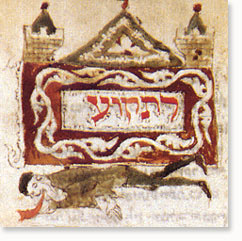|
The shofar blower keens a melody,
An old melody to God.
Above him—
A sky without stars,
Primordial darkness lost in darkness,
The shofar blower keens a melody:
Teki’ah, Teru’ah, Shebarim.
The blackness—a wind, a wall,
There is no congregation,
No quorum at all.
The shofar blower keens a melody,
An old melody:
Hallelujah.
Near him, an extinguished thorn,
As he stares into even blacker darkness,
The shofar blower keens a melody,
An old melody,
And waits—
The thorn shall begin to burn,
A flame shall inscribe on a wall.
Above him, a sky without stars,
And primordial darkness,
And deadly venom.
But this does not interrupt,
Does not silence the horn:
Teki’ah,
Teru’ah,
Shebarim.
|

Man blowing shofar
(above left); Litkoa ("to sound the shofar:): details
from
14th-century German manuscript,
Courtesy: HUC-JIR Klau Library
Click
to view enlarged |

|



